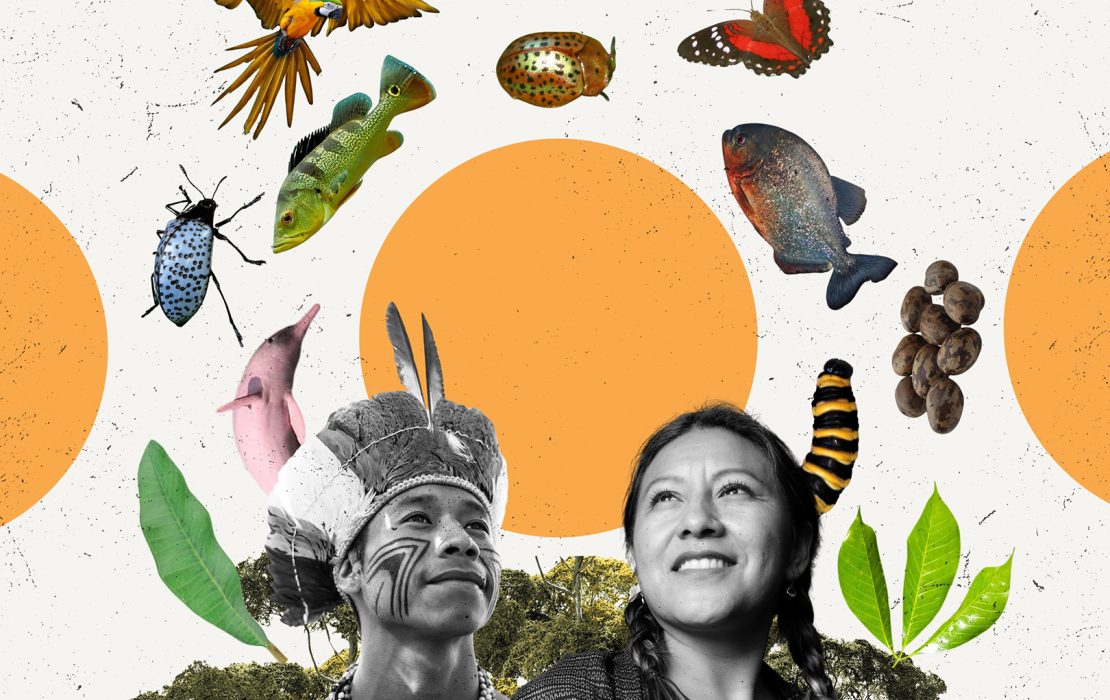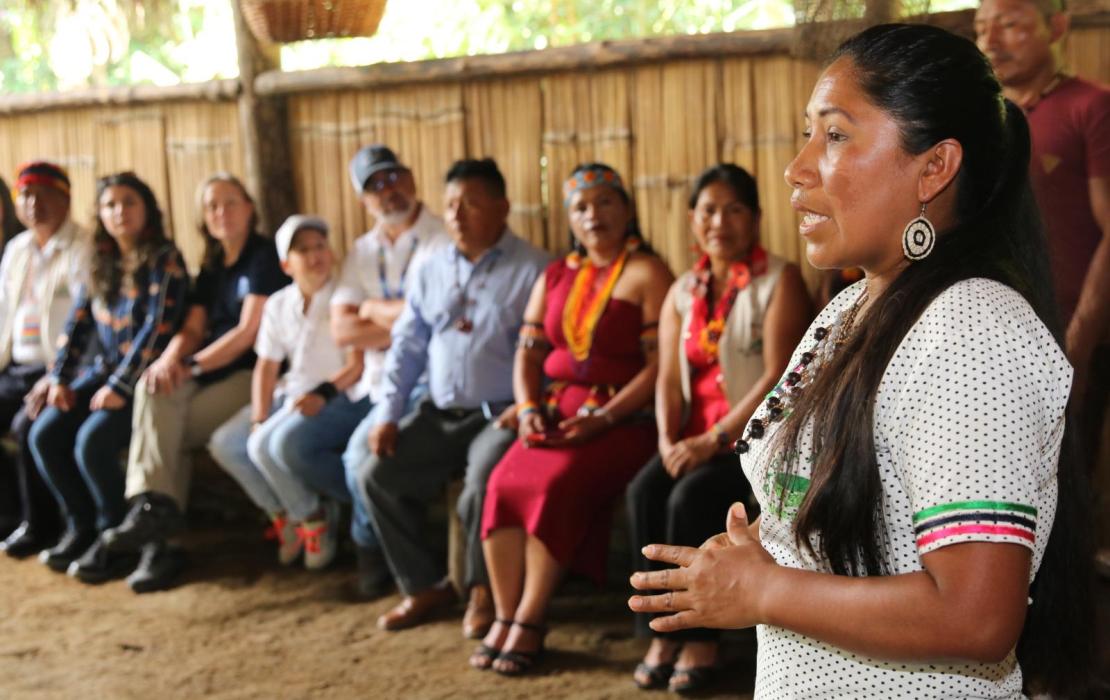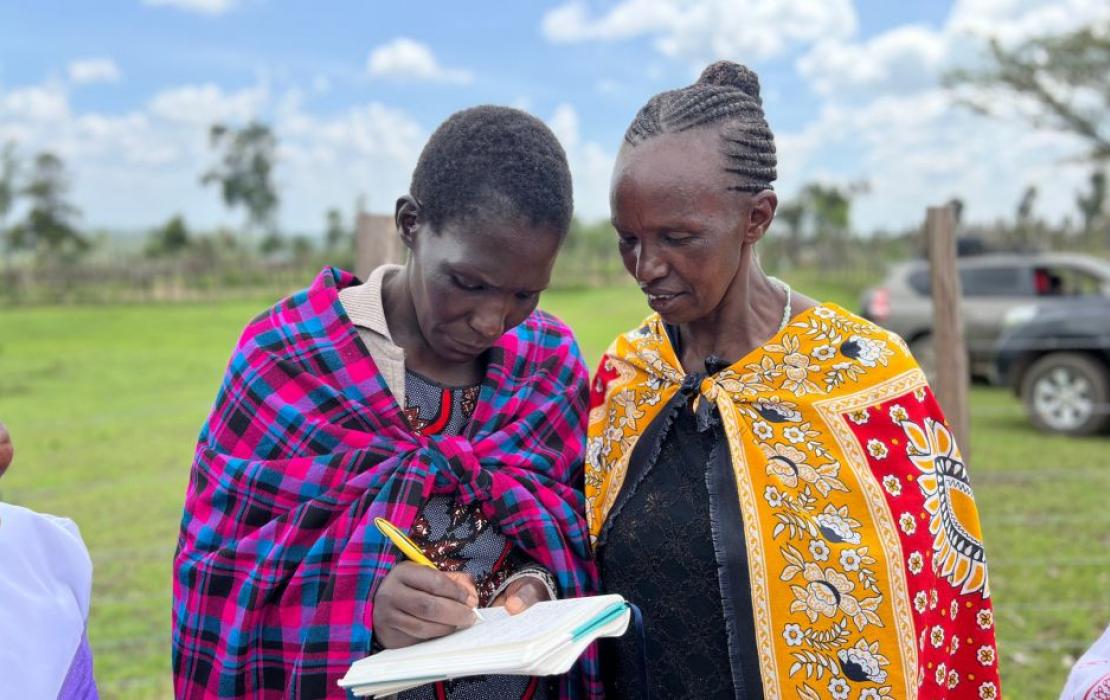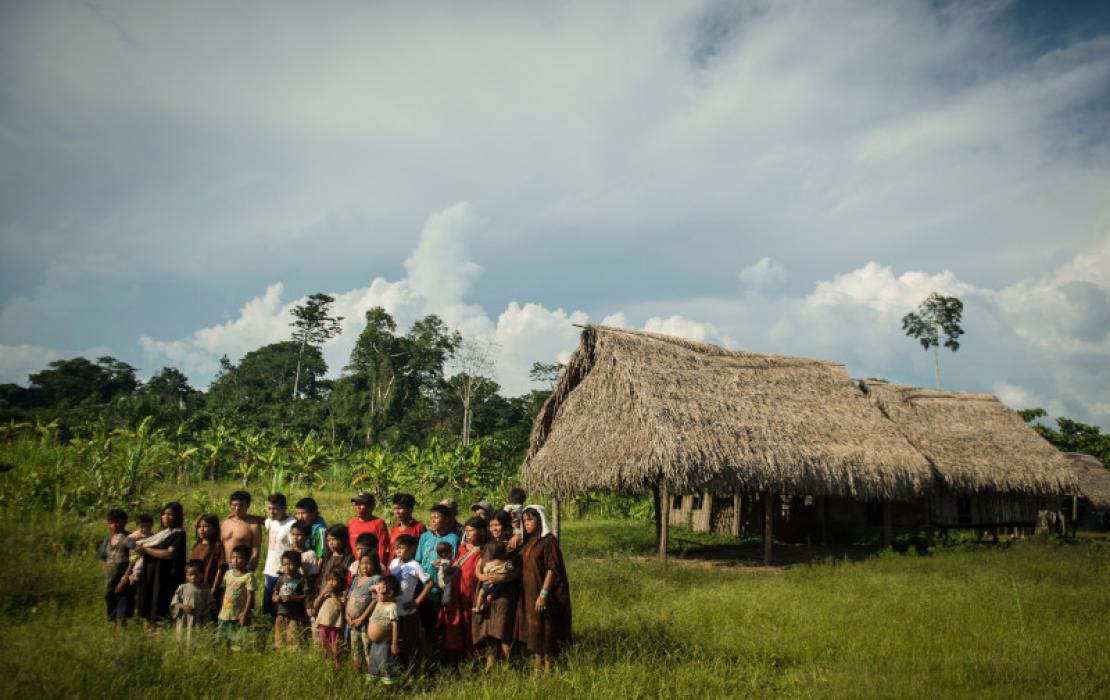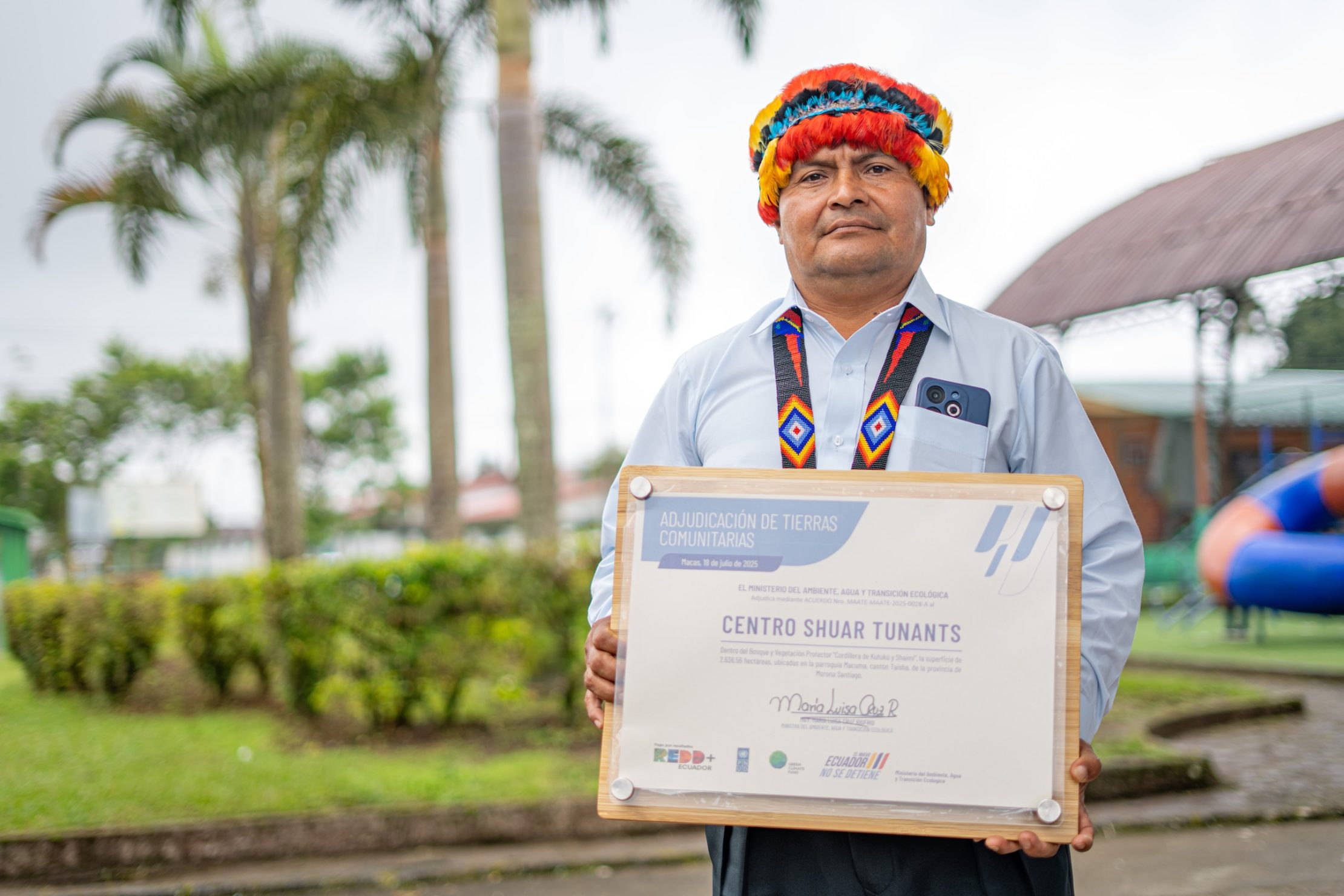
Photo: UNDP Ecuador
"Nature has always cared for us, and that’s why we made the decision to protect it and every being that lives within it. I’m grateful to everyone who supported us, and today, I feel incredibly proud," said Mónica Antich, an Indigenous Shuar woman from the Tsuntsuim community, at a gathering in Macas, in the Ecuadorian Amazon.
Macas is the capital of the Morona Santiago province, located in southeastern Ecuador, which is home to different Indigenous cultures and extraordinary biodiversity, including vast stretches of protected Amazonian forests. After more than a decade of struggle, Mónica’s community, along with two other communities of the Shuar Indigenous Nationality of Morona Santiago, received the titles to their ancestral lands on 18 July 2025. The moment marked a major historic win, with the official recognition of their rights to lands that have always been theirs.
More than 1,000 people from the Shuar communities of Pumpuis, Tayuntza Norte, Kampan, Tunants, and Tsuntsuim, nearly half of them women, have benefited from this process. "Today is a historic day," said Manuel Najandey, president of the Shuar Kampan Center. "For more than ten years we were forgotten. But we never gave up. During all those years, we were worried, fighting steadfastly for what we have achieved today. Receiving this title is a very exciting moment for me and for my entire community."
Securing land rights for Indigenous Peoples and local communities is essential not only to upholding their cultural identity and supporting their livelihoods, but also to preserving the ecosystems they have cared for over generations. Indigenous Peoples steward more than a third of the world’s intact forests which hold much of the Earth’s biodiversity and carbon reserves. Yet, they legally own only a small fraction of the territory they inhabit and protect.
Photo: UNDP Ecuador
Photo: UNDP Ecuador
A historic day for the Amazon
The event in Macas marked a major step in strengthening the relationship between the Ecuadorian government and the Indigenous communities of the Amazon. On that day, the national government officially handed over land titles securing the legal rights of three Shuar communities within the Kutukú Shaimi Protected Forest, one of the largest and most important conservation areas in the Ecuadorian Amazon. The ceremony was led by President Daniel Noboa Azín and Minister of Environment, Water and Ecological Transition María Luisa Cruz.
"We have come to settle a historical debt, delivering the property titles for more than 9,300 hectares that you have protected, cared for and, above all, conserved. We have come to recognize your wisdom and the respect you have had for nature," said Minister María Luisa Cruz in her speech, addressing the Indigenous representatives.
The awarded land comprises the following hectares: 2,636 hectares to the Shuar Tunants community, 3,879 hectares to the Shuar Kampan community, 2,809 hectares to the Shuar Tsuntsuim community. These are in addition to the hectares already managed in the Shuar Pumpuis community with 1,753 hectares and Tayuntza Norte with 7,331 hectares. A total of 18,408 hectares have been allocated in the Kutukú Shaimi Protected Forest in 2024 and 2025.
Thanks to the efforts led by the Ministry of Environment, Water and Ecological Transition (MAATE), with technical support from UNDP through the REDD+ Results-based Payment for Results Project and PROAmazonia, and funding via the Green Climate Fund (GCF), these areas of the Amazon rainforest are now under the legal protection of the Shuar people, thus returned to their rightful custodians.
“This progress is the result of more than a decade of sustained work, during which UNDP, as the UN's leading development agency, has supported Ecuador and its institutions in fulfilling the commitments established in the Constitution and the REDD+ Action Plan, as well as international commitments such as the Agenda 2030, which recognizes that truly inclusive and equitable development is only possible if Indigenous Peoples are given a voice and space,” said Inka Mattila, UNDP Resident Representative in Ecuador.

Photo: UNDP Ecuador
A participatory and rigorous process
This achievement was no coincidence. For four years, communities and institutions worked hand in hand through a comprehensive and inclusive process grounded in the principle of Free, Prior and Informed Consent (FPIC). During this time, a total of 72 participatory sessions were held, distributed across the different Shuar communities. These gatherings were key to defining territorial boundaries and collaboratively developing Integrated Management Plans with the communities.
“We created the plan together with everyone involved,” said Mateo Yangora, president of the Tunants Shuar community. “It includes conservation measures because the forest is not just our livelihood; it’s our life.”
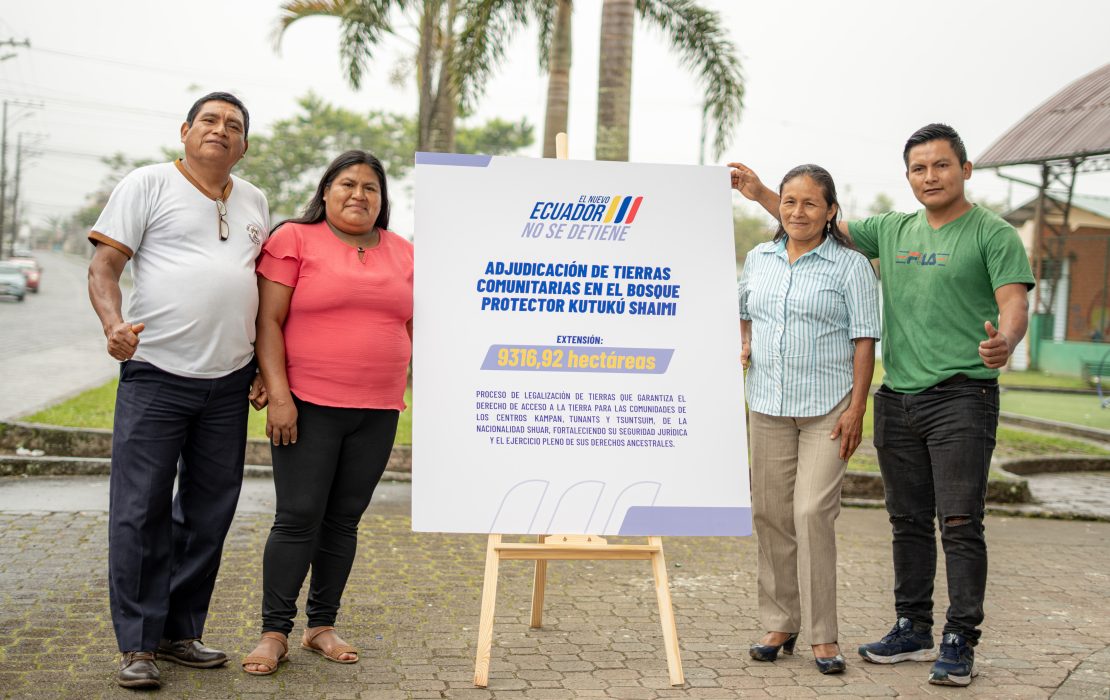
Photo: UNDP Ecuador

Photo: UNDP Ecuador
Legal recognition of Indigenous Peoples’ lands not only promotes social justice and human rights but is also key to addressing climate change. These ancestral lands are located in high biodiversity areas and are key for Ecuador to meet its REDD+ commitments and the Sustainable Development Goals (SDGs), as well as its climate commitments under the Paris Agreement.
Beyond securing legal protection, these land titles pave the way to vital services like drinking water and sanitation. For many women, they also represent a chance for economic empowerment and community growth. “Now, as women, we can become entrepreneurs,” shared Mónica, who is involved in the work of the Tsuntsuim Shuar Center. “We can unite, start projects, and strengthen our communities. I encourage other women to legalize their land. The effort is worth it!”
Protecting the forest is protecting ourselves
Studies have shown that Indigenous territories have lower rates of deforestation and environmental degradation. This is largely attributed to the traditional ecological knowledge, sustainable land stewardship practices, and strong cultural and spiritual connections Indigenous communities maintain with their ancestral lands.
Within the Pumpuis community, a forest restoration initiative is also underway to reforest 100 hectares with 10,000 native trees, including timber, fruit and medicinal species. This reforestation effort supports the recovery of the Kutukú Shaimi Protected Forest, a vital conservation area for both Indigenous and local communities, as well as for Ecuador’s broader environmental health.
“Without trees, we get sick,” said Mónica. “Nature protects our health. That’s why we’ve chosen a new path: to safeguard the forest, the animals and the water.”
“Humans are not separate from nature,” added Manuel. “We are part of it. And we will continue protecting the rainforest and all the life it holds.”

Photo: UNDP Ecuador
A model for others to follow
This achievement sets a powerful precedent and a model that can be replicated by other Indigenous Peoples across Ecuador and beyond. For the first time in over a decade, these communities have obtained full legal recognition of their lands, along with the tools to defend their territory and shape a sustainable, self-determined future.
“Many didn’t believe this was real,” said Mateo. “But today we see it with our own eyes. I invite other communities to join and fight for the legal recognition of their lands.”
“Without titles, there are no guarantees,” emphasized Manuel. “Legalizing our land means protecting our rights, our forests and our future.”
For these communities, the land titles represent far more than property, they symbolize both the preservation of their heritage and the right to decide their own future. “This process has benefited women and men alike, our entire families,” Mónica says. “Now that our lands are legalized, the whole community feels protected. No one can come and take what is ours. Now, we feel safe.”
***
UNDP’s Climate Promise is the UN system’s largest portfolio of support on climate action, working with more than 140 countries and territories and directly benefiting 37 million people. This portfolio implements over US$2.3 billion in grant financing and draws on UNDP’s expertise in adaptation, mitigation, carbon markets, climate and forests, and climate strategies and policy. Visit our website at climatepromise.undp.org and follow us at @UNDPClimate.
UNDP Climate & Forests systematically promotes social equity, including the rights, knowledge, and inclusion of Indigenous Peoples and local communities, to ensure forest solutions to climate change contribute meaningfully to delivering on the NDCs and advancing the SDGs. The work in the Ecuadorian Amazon is supported by the Green Climate Fund through results-based payments, and by the UN-REDD Programme in advancing forest conservation and climate goals in the region.
Explore More Stories
Indigenous women in Kenya are leading the way in forest conservation while preserving their cultural heritage.
